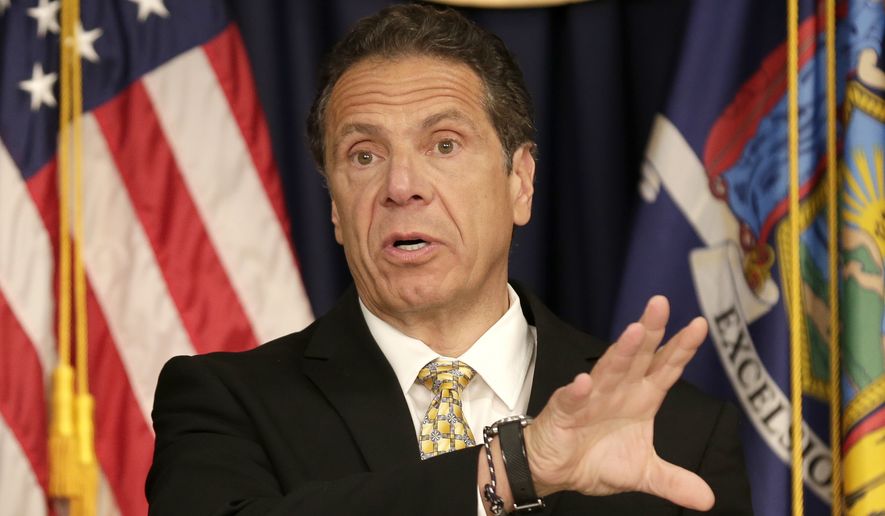Several states followed through on pledges to sue over Congress’ $1.5 trillion tax cut law, saying in a long-shot lawsuit filed Tuesday that it infringes on their rights to set their own spending policies and unfairly singles them out for punishment.
The lawsuit, filed in federal court by the attorneys general of New York, New Jersey, Connecticut and Maryland, argues that a $10,000 limit on the amount of state and local taxes that residents can deduct from their federal returns exceeds Congress’ taxing authorities.
“The federal government is hellbent on using New York as a piggy bank to pay for corporate tax cuts, and I will not stand for it,” said New York Gov. Andrew Cuomo. “We will fight back at every turn against President Trump and the federal government’s partisan assault to protect the people of New York.”
The lawsuit argues that the tax law violates the 10th Amendment governing states’ rights by infringing on their authority to make sovereign decisions on local investments, and that federal lawmakers have acknowledged that the cap was intended in part to force states to reduce their spending.
The lawsuit also says the cap exceeds Congress’ constitutional authority to impose and collect taxes because it coerces states into lowering their taxes and then cutting services that the taxes support.
The cap also disproportionately benefits other states and will harm the economies of the states, the lawsuit says.
The effects of the new cap on the state and local deduction are particularly pronounced in blue states such as New York and New Jersey, where higher state and local taxes translate to more lucrative write-offs when people tally their deductions during filing season.
“This Court should invalidate this unconstitutional assault on the States’ sovereign choices,” the lawsuit says.
The Treasury Department responded Tuesday that it was reviewing the complaint, but analysts said it stands little chance of succeeding.
Brian Riedl, a senior fellow at the right-leaning Manhattan Institute, called the lawsuit a “public relations stunt” and a “joke.”
“There’s no constitutional mandate that rich New Yorkers get a federal tax cut when their state and local taxes rise, and that’s essentially what this is about,” he said.
The states could be trying to get ahead of forthcoming guidance from Treasury on whether workarounds to the $10,000 cap will fly under federal rules, said Andy Grewal, a professor at the University of Iowa College of Law.
“I would be utterly shocked if this proceeded,” he said. “I doubt they filed this lawsuit because they expected to win.”
The Treasury Department has already warned states enacting workarounds to the $10,000 cap to tread carefully. It said forthcoming guidance will make clear that federal tax regulations — and not state interpretations — will dictate the rules of the road.
Mr. Grewal said the lawsuit could be aimed at bolstering states’ policy arguments against the forthcoming guidance.
“They’re trying to prevent the IRS from acting aggressively, or what they believe to be aggressively, as opposed to actually trying to win a lawsuit,” he said.
Sen. Tim Scott, South Carolina Republican and a member of the tax-writing Senate Finance Committee, said he wasn’t buying the argument that the new law infringes on states’ rights.
“I think it’s weak at best, and we’ll figure it out as we move forward — or the courts will, obviously,” Mr. Scott said.
But a judge is unlikely to rule that the deduction cap violates the 10th Amendment, said Joseph Bishop-Henchman, executive vice president of the Tax Foundation.
The provision does not state that the cap applies only to Democrats or Republicans, nor does it “commandeer” state legislative processes or force states to adopt federal policy, he wrote.
“The concern that high state taxes might harm the competitiveness or attractiveness of a state like New York or Connecticut is a valid one, but the solution lays with revisiting those state tax rates rather than meritless litigation,” he wrote earlier this year.
A spokesman for Rep. Kevin Brady, Texas Republican and chairman of the tax-writing House Ways and Means Committee, pointed to Mr. Brady’s past comments expressing disappointment that some politicians are still trying to defend higher taxes.
“There are many mayors and governors who do a good job of balancing budgets and creating jobs in their communities without high taxes, and I encourage those few states that are trying to undermine our growing economy to instead focus on how they can lower their own taxes on their constituents and keep moving our economy forward,” Mr. Brady said in May.
• David Sherfinski can be reached at dsherfinski@washingtontimes.com.




Please read our comment policy before commenting.